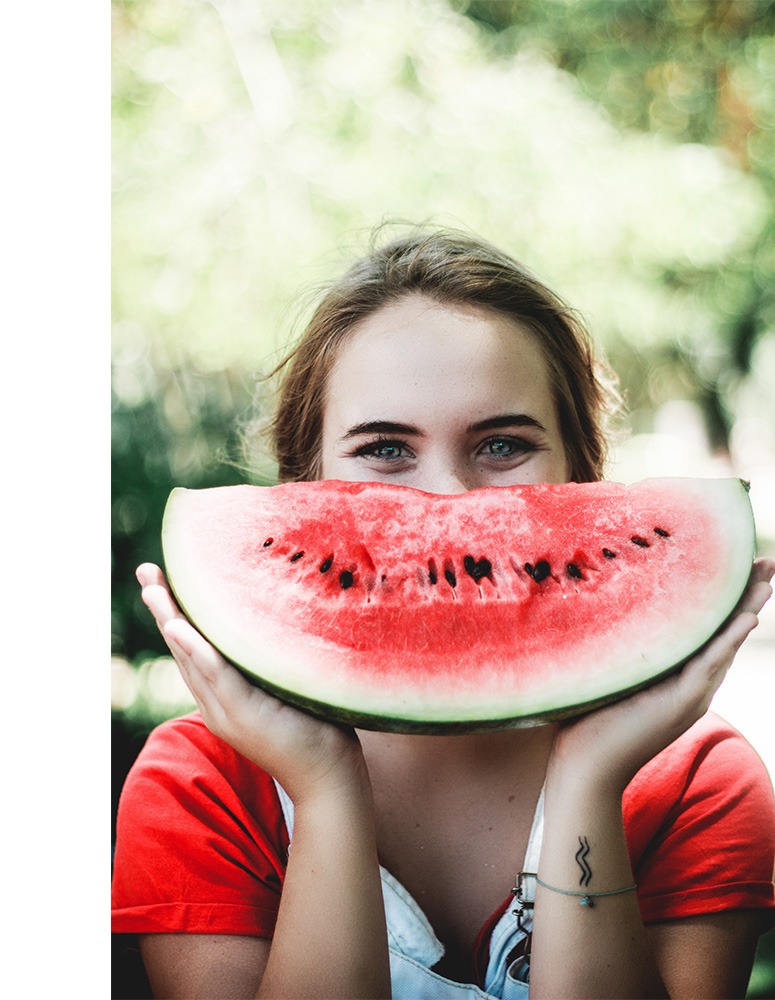Eat Your Watermelon!
Summertime, and the living is juicy!
You’ve heard me say to “Eat your water.” But now that summer is here and watermelons are plentiful, I want to be more specific: Eat your watermelon!
Watermelons are great for your skin—and for every cell in your body. They’re water-rich, adding the moisture your cells need to thrive. Watermelons also contain antioxidants, which counteract aging, wrinkles, and dryness and also brighten the skin. Other watermelon ingredients protect from sunburn and other harsh environmental conditions such as dry, cold weather, air conditioning, and pollution. Plus, watermelon rind, applied topically, can soothe rashes and the juice, again applied topically, works as a gentle exfoliant.
Want to know more?
- Watermelons are water-rich, containing 92% water by weight—the most of any fruit. Hydration being the most important component of my anti-aging program, eating watermelon is a delicious way to give your cells the water they need.
- Watermelons are rich in antioxidants—including vitamin C, glutathione, and perhaps most importantly, lycopene, currently the most powerful antioxidant that has been identified in food. Antioxidants neutralize free radicals, which otherwise accumulate, resulting in oxidative stress—the cumulative damage associated with aging.
- Watermelons protect the skin from sunburn. Lycopene to the rescue again! Watermelons, along with guavas and tomatoes, are among the foods richest in lycopene, which appears to play a role in preventing cancer, heart disease, macular degeneration—and sunburn. Research—including my own—shows that a diet rich in lycopene reduces the skin reddening and erythema caused by exposure to UV light, improving the effectiveness of topical sunscreen. (Use both!)
- Watermelons brighten skin and fight hyperpigmentation, aka “age spots.” Another powerful antioxidant in watermelon is glutathione, which has skin-lightening properties. Specifically, glutathione works to inhibit production of tyrosinase, an enzyme with an important role in the production of melanin—the darkening compound in skin. Eating watermelon—and applying it topically to patches of hyperpigmentation in your skin—can lighten dark spots.
- Watermelons are rich in vitamin C, which plays a critical role in the synthesis of collagen, the protein that gives your skin strength and structure. In one large study of middle-aged American women, a higher intake of vitamin C was linked to a lower likelihood of having dry and wrinkled skin. A wedge of watermelon contains 23.2 mg of vitamin C, or 25% of your RDA for this essential nutrient.
- Watermelon protects the skin against harsh environments. Watermelon contains an amino acid known as L-citrulline, which the body converts into another amino acid, L-arginine, which protects the skin from abrasive conditions including dry, cold climates, air-conditioned air, and pollution.
- Watermelon is a gentle exfoliant. Watermelon is rich in the alpha-hydroxy acids citric acid and malic acid, which are natural exfoliants. Regular exfoliation rids the skin of dead cells, brightening your complexion and boosting collagen production. To get the benefits, all you have to do is apply a little watermelon juice to your face. For a more invigorating treatment, combine equal amounts of organic sea salt and fresh watermelon and give yourself a watermelon scrub!
- Watermelon even soothes rashes. An Ayurvedic treatment for skin rash utilizes watermelon—both eating the fruit and rubbing the rind on the skin. This can work particularly well on heat rashes. For even more cooling relief, refrigerate a watermelon rind for several hours and then apply it to the heat rash-affected skin.
Now that summer is here and watermelons are plentiful, be good to your skin—and your self—and eat your watermelon!
